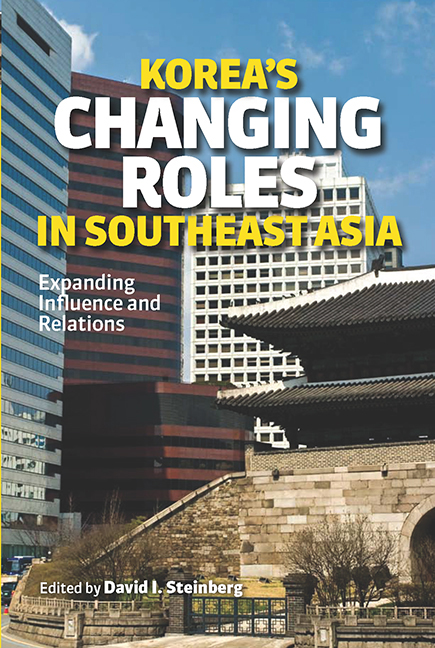Book contents
- Frontmatter
- Contents
- List of Tables, Figures and Photos
- Foreword
- Message
- Acknowledgements
- The Contributors
- 1 Tenuous Beginnings, Vigorous Developments
- 2 Perspectives on Korea's Role in ASEAN
- 3 South Korea and Southeast Asia: Ideas for Deepening the Partnership
- 4 Divergence Amidst Convergence: Assessing Southeast and Northeast Asian Security Dynamics
- 5 Korea's Economic Relations with Southeast Asia
- 6 Investment of Korean Electronics Industry in Southeast Asia
- 7 Korean Assistance to Southeast Asia
- 8 Korean Development Model: Lessons for Southeast Asia
- 9 Southeast Asian Migrant Workers in South Korea
- 10 Filipina Wives and “Multicultural” Families in Korea
- 11 A Fading Wave, Sinking Tide? A Southeast Asian Perspective on the Korean Wave
- 12 The Korean Wave: Korea's Soft Power in Southeast Asia
- 13 The Republic of Korea in Southeast Asia: Expanding Influences and Relations
- 14 Korea's Preparation for Southeast Asia: Research and Education on Southeast Asian Studies in Korea
- 15 Conclusion
- Index
12 - The Korean Wave: Korea's Soft Power in Southeast Asia
Published online by Cambridge University Press: 21 October 2015
- Frontmatter
- Contents
- List of Tables, Figures and Photos
- Foreword
- Message
- Acknowledgements
- The Contributors
- 1 Tenuous Beginnings, Vigorous Developments
- 2 Perspectives on Korea's Role in ASEAN
- 3 South Korea and Southeast Asia: Ideas for Deepening the Partnership
- 4 Divergence Amidst Convergence: Assessing Southeast and Northeast Asian Security Dynamics
- 5 Korea's Economic Relations with Southeast Asia
- 6 Investment of Korean Electronics Industry in Southeast Asia
- 7 Korean Assistance to Southeast Asia
- 8 Korean Development Model: Lessons for Southeast Asia
- 9 Southeast Asian Migrant Workers in South Korea
- 10 Filipina Wives and “Multicultural” Families in Korea
- 11 A Fading Wave, Sinking Tide? A Southeast Asian Perspective on the Korean Wave
- 12 The Korean Wave: Korea's Soft Power in Southeast Asia
- 13 The Republic of Korea in Southeast Asia: Expanding Influences and Relations
- 14 Korea's Preparation for Southeast Asia: Research and Education on Southeast Asian Studies in Korea
- 15 Conclusion
- Index
Summary
The slang word ttan ttara is pervasively used in Korea, describing popular artists such as pop singers, actors, and actresses on stage and on film. The term may be derived from the rhythmical sound of “ttan/ttan/tta-ra/tta-ra”, that spontaneously comes out of your throat when you follow the rhythm of dance music. And yet, the word has a negative connotation. Many Koreans, especially intellectuals in their fifties and over, have had a disparaging attitude towards them. They were of the opinion that popular culture was “lowly” and “vulgar” and were taught from early childhood to focus on more intellectual activities.
Until the nineteenth century in Korea, popular entertainers were usually perceived and treated as lowly people. Even though such perceptions may not have been unique to Korea, it was especially prevalent in Korea's Confucian society until the early twentieth century. In recent times, however, popular artists in Korea have been very successful domestically and abroad, especially in East Asia, transforming the image of the country in a way that the government and its diplomats have been unable to do on their own.
In the last few decades, despite its stories of economic success and political achievements, South Korea has often been depicted by foreigners as a problem-ridden nation characterized by conflicts with the North, violent anti-government demonstrations, and hardline trade union movements. However, Korean popular culture in the form of pop songs, movies, television serials has lent the country a more positive appeal. Let me tell you the story of Candy Shu, a twenty-two-year-old Malaysian girl. Candy was shopping in a video store in Kuala Lumpur when she told a Korean lady there that she and her parent had become enthusiasts of Korea after watching Korean television serials. She stated that her image of Korea had changed from that of a feudalistic and patriarchal county to an open and democratic society. This is just one of many such instances.
From the late 1990s, the winds of Korean popular culture have been blowing over East Asia; now, strong gusts are moving across the Pacific, the Indian Ocean and the Takla Makan Desert and stirring interest in Central Asia, North Africa, and even Latin America. This phenomenon, known as the Korean Wave, refers to the recent surge of popularity of Korean popular culture abroad, especially in East Asia.
- Type
- Chapter
- Information
- Korea's Changing Roles in Southeast AsiaExpanding Influence and Relations, pp. 283 - 303Publisher: ISEAS–Yusof Ishak InstitutePrint publication year: 2010

